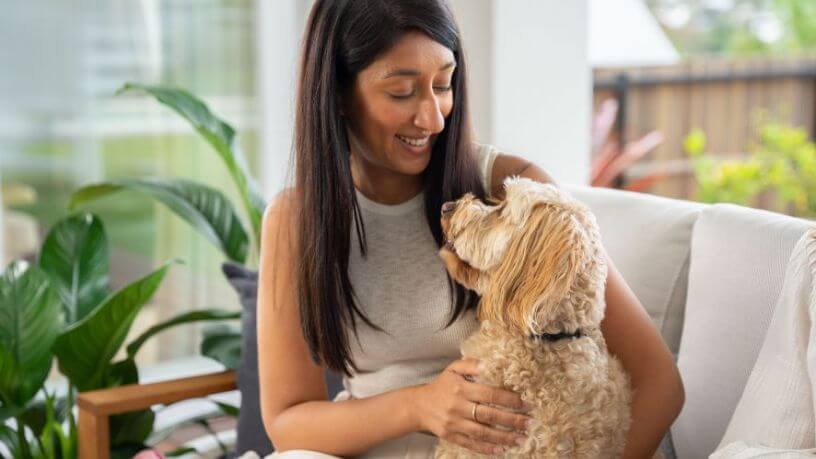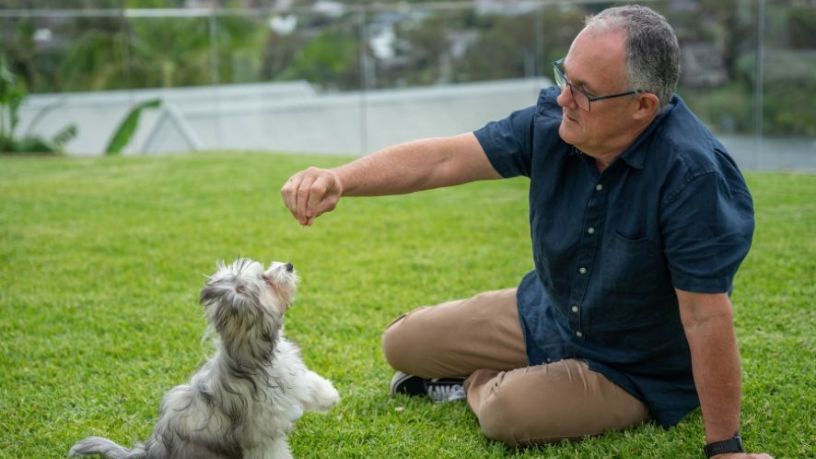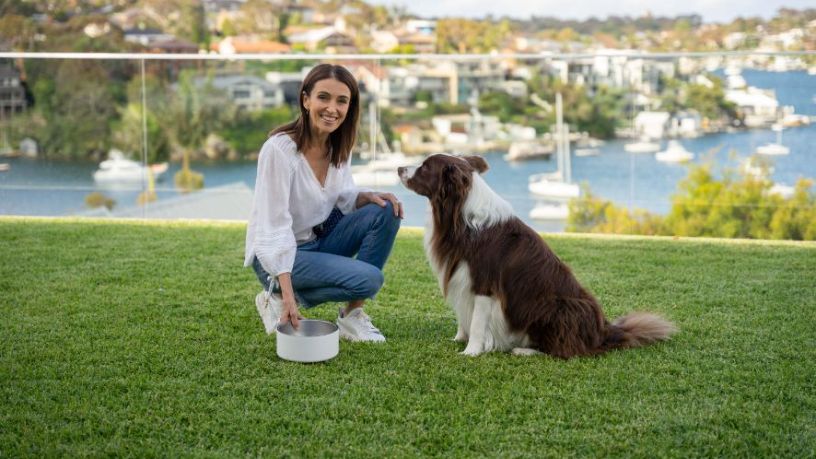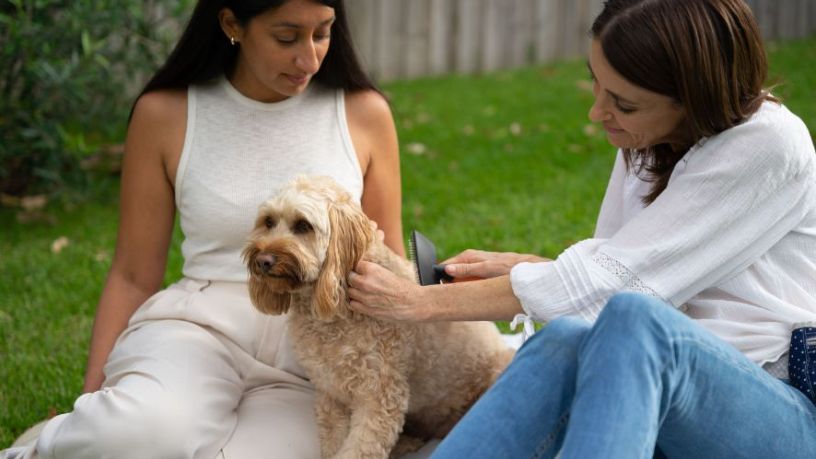Make any changes in walking times or access to the home before the baby arrives so your dog doesn’t associate anything new or different with your newborn.
On this page
Key takeaways
Introduce your dog to the baby slowly and don’t force interactions if your pup is nervous or unsure.
No matter how gentle your dog, never leave your baby alone with a pet as accidents can happen (especially when baby starts to crawl and grab).
Bringing home a newborn baby is an incredibly exciting time for the entire family, and most dogs will happily welcome the newest member. But having a newborn in the home will be a huge change for a pup, especially if they’ve been the only ‘child’ up until that point.
We spoke to Sydney Animal Behaviour Service’s Resident in Veterinary Behaviour Medicine, Dr Grace Thurtell (BVSc, MANZCVS: Veterinary Behaviour) about how new parents can safely introduce a dog to a newborn while making sure the fur baby still feels like an important part of the family.
Preparing for baby's arrival
Dogs and newborns do mix if you put in some groundwork before the new arrival.
“Introduce new boundaries early,” advises Dr Thurtell. “Put up baby gates early to get your dog used to not being able to have free access to the whole house. Set up the nursery, prams, etcetera to get the pet used to the new items in the house.”
With a newborn at home, it’s likely your dog’s usual routine will be shaken up a lot, so it’s a good idea to start implementing these changes early too. This could mean walking them at different times or even getting a dog walker to start taking them for their morning stroll while you have your hands full. Whatever changes you make, be sure to make them fun and enjoyable for your pup with lots of praise, pats, toys and treats.
Dr Thurtell also recommends getting your dog used to the noises a baby makes ahead of time.
“Some dogs are quite unsettled by newborn crying initially, but as it happens so frequently, most adapt to it after a few days to weeks,” she says, adding that the book ‘Tell Your Dog You’re Pregnant’, by Dr Lewis Kirkham, is a good pick to help prepare and introduce your dog to a newborn.
“It also has recordings of baby noises, so you can start introducing them to your pet at lower volumes to help them get used to it before the baby arrives.”
You can find similar free audio tracks online.
Bringing home your baby
Before you bring home the baby, the RSPCA advises getting your dog used to the new arrival’s scent.1 Swaddle your baby in a new, washed blanket in the hospital so the cloth picks up their scent, then present it to your dog along with plenty of treats and praise so they make a positive association with the baby’s smell.
When the time comes to bring your newborn home, your dog will already know their scent and know that it’s a good thing.
When you arrive home from the hospital, before introducing your dog to your newborn, the RSPCA also advises letting Mum greet the pup first1, without the baby, especially if they haven’t seen each other for a few days. This lets your dog get out their excitement before they meet the new family member.
How to introduce a dog to a newborn
Introducing your pup to your baby should be a gradual process and it’s important to keep all their interactions positive. Keep their first encounter brief, calm and positive by leading the dog into the room on its leash and allowing it to smell the baby in your arms.
“Newborns smell great to dogs,” says Dr Thurtell. “Often dogs are very interested in smelling newborns thoroughly when they arrive.”
It’s important that a second adult not holding the baby has a good hold on the pup so they don’t accidentally cause any harm.
“Some dogs can get too excited with the initial introduction and jump up”, advises Dr Thurtell.
Make sure your dog is on their best behaviour during meet-and-greets (that is, sitting calmly, not jumping up) and continue to reward them for good behaviour. And, importantly, do not force your dog to interact with your newborn if they’re nervous. Let them take it at their own pace and continue to give gentle praise and reward. There’s no need to rush this process.
One of the most important things to remember when it comes to dogs and newborns is never to leave them alone together. No matter how well behaved your pup is, accidents can happen, particularly as children get older and may behave in ways they don’t realise are stressful or aggravating for the dog.
“The biggest stressor for most pets is when the child starts crawling and walking, rather than the newborn stage,” explains Dr Thurtell. “Once kids start moving, they want to follow the animal everywhere and they grab at them and crawl on them which can be stressful for the pet and a high risk of a bite to the child.”
Keeping a leash on jealousy
“Some dogs struggle with sharing their fur-parent’s lap with the newborn and [not getting] as much attention from their owners as they did prior to the baby,” says Dr Thurtell. There are several things you can do to help make sure your dog still feels like a valued member of the pack despite the new arrival.
As well as giving your dog quality solo time, try to involve them in fun activities where your baby is also present, so they learn that good things happen when your bub’s around. This might be taking both your baby and your dog out on walks, feeding your dog at the same time as the baby is feeding or giving your pup a special tasty treat when you’re spending a lot of time with the baby, such as feeding or nappy changing.
With a bit of prep work and some clever multitasking, introducing a dog to a newborn can be a safe, calm and wonderful experience for the whole household.

At Bupa, trust is everything
Our health and wellbeing information is regularly reviewed and maintained by a team of healthcare experts, to ensure its relevancy and accuracy. Everyone's health journey is unique and health outcomes vary from person to person.
This content is not a replacement for personalised and specific medical, healthcare, or other professional advice. If you have concerns about your health, see your doctor or other health professional.
Noonan, A. (2020). Hey baby! Introducing pets to babies. RSPCA Queensland.
You might also like...
5 golden rules for dog training
Time to teach your dog the house rules? We’ve put together 5 tips to help make obedience training easy, stimulating, and a lot of fun for your fur-baby!
How to train your dog the right way
Done right, training can improve your pup’s confidence, help you create a loving and healthy bond, and be a lot of fun! But which training style is best?
How to teach a dog to come when called
Teaching your dog to come when you call is one of the most important things you can do to keep them safe when you’re out and about. So, how does recall training work?
The essential dog grooming guide
Whether you’re giving them the usual brush, bath and trim or treating them to some TLC, it’s important to know how to safely and effectively groom your dog.





